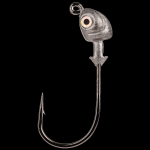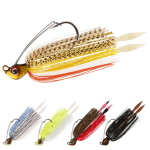sunafresco
Member
- Joined
- Feb 10, 2025
- Messages
- 13
- Reaction score
- 8
What is a Coated Jig Head?
In simple terms, the definition of a coated jig is a lead jig head that has been coated with a protective layer in order to increase its durability, stop corrosion and rust and, sometimes, improve its appearance.Nickel-Coated Jig Heads
Nickel is a popular choice for coating the heads of jigs, and with good reason. Nickel coatings are usually long-lasting, smooth and have a glossy reflective surface that could lure fish.Corrosion Resistant: These jig heads are especially resistant to corrosion which makes them perfect to use in saltwater fisheries. The shiny finish also deters wear and tarnishing. This is vital when fishing in harsh conditions.
Appearance: The reflective surface of jig heads coated with nickel replicates the natural sheen of tiny baitfish, making them very efficient in clear waters or intense sunlight.
The best use: If you're fishing for fish species such as walleye bass, as well as saltwater species like flounder and sea bass, then a jig coated with nickel could be an excellent option. The coating is particularly useful in clear water or in sunny weather where visibility and reflection matter the most.
Pro Tips: Keep in mind that even though nickel coatings last, they can also be slippery to handle and rigging them, so be careful when you are rigging or tying them.

Zinc-Coated Jig Heads
Zinc is another popular material for coating the heads of jigs. Commonly used in tackle boxes for freshwater, zinc-coated jig heads provide the perfect balance between protection and affordable.The resistance to corrosion: Zinc provides an adequate level of protection from corrosion and rust, especially in freshwater settings.
Strength and Durability: Zinc coatings tend to be slightly more dense than other coatings. This could add additional weight to the jig, which makes it ideal for fishing deeper or using heavier lures.
The best use: Zinc-coated jigs are ideal for freshwater anglers who hunt for fish like crappie, bass or perch. They're especially effective when fishing in slightly murkier waters or when you're required to lower your jigs to more depths.
Pro Tips: Zinc-coated jigs are an excellent budget-friendly option but be aware that they could wear out quicker than other coatings, particularly with frequent usage in salty environments.
Ceramic-Coated Jig Heads
Ceramic coatings are the top choice for Jig heads. They offer a smooth finish. The coatings are commonly utilized on jigs that are designed for anglers who are serious.Corrosion Resistance: These Jig heads are extremely resistant to corrosion and offer great protection against the elements. This makes them ideal for saltwater or freshwater fishing in harsh conditions.
The Smooth finish: The ceramic coating gives a smooth, almost glass-like surface that helps prevent corrosion and increases the jig's longevity. Smoothness can also mean less resistance to water. It will increase the casting distance and control.
Best use: Ceramic coatings are popular for saltwater fishing, particularly to target large species such as grouper or tuna. They are also excellent for freshwater fishing that is top-of-the-line such as bass tournaments, where the quality and endurance are crucial.
Pro Tips: Because ceramic coatings are typically more expensive than nickel or zinc, they're better suited to serious anglers willing to invest in lasting endurance and performance.
Titanium-Coated Jig Heads
Jig heads coated with titanium are the most durable of the bunch in terms of their durability as well as resistance against corrosion. That is why the titanium-coated jig head is frequently used by anglers who have long stints in salt or brackish water.Stability and Durability: Titanium-coated jigs are exceptionally sturdy, and resistant to cracks and maintain their integrity even when under a lot of stress.
Best Use: Titanium-coated jig heads are ideal for fishing heavy-duty, whether you're hunting for large sport fish from the ocean, or hunting the largest bass in lakes. These jigs are great for saltwater and freshwater environments.
Pro Tips: Titanium-coated jig heads are superb for endurance and durability, but they carry an expensive price. They're best for anglers with experience who require top-of-the-line performance and are worth the expense.

Powder-Coated Jig Heads
Jigs that are coated in powder are utilized in many different ways and come in a wide range of colors and finishes. Although powder coatings are generally effective in preventing corrosion they are more vulnerable to wear and tear they are compared to metal coatings.Most Effective Uses: Powder-coated jig heads are great for anglers wanting to test different colors to find out what works best for the species of fish within their region. They are particularly effective for bass fishing as well as when targeting species that depend on visual clues.
Pro Tips: Powder-coated jigs may not last as long as counterparts coated with metal. However, they're perfect for fishing in muddy or stained waters where the contrast of colors can affect the outcome.
Finally
Find your fishing style:
Saltwater anglers: If you are someone who spends a significant amount of time in water that is salty, ceramic, titanium or nickel-coated jig heads are the most effective options for long-lasting protection.
Freshwater anglers: In the case of rivers or lakes, powder-coated and zinc fishing jigs make excellent choices for those looking to try different colors or are looking for a low-cost option for daily use.
Bass and Tournament Fishing: For those who require high-performance, titanium-coated or ceramic jig heads offer the strength and durability you require to compete at the top standard.
The bottom line is that each angler's tackle box is differently based on their individual preferences and styles of fishing. Understanding the specifics of each kind of coated and uncoated jig heads will mean you're more prepared to make the right decision, helping you catch more fish and get the most of your time in the water.
